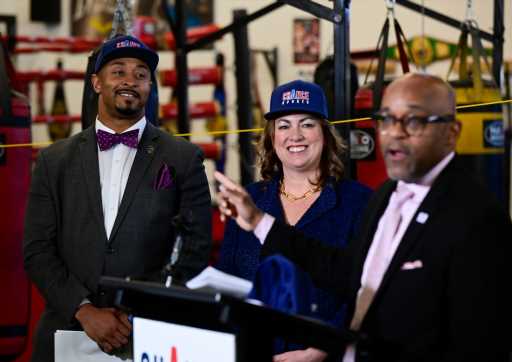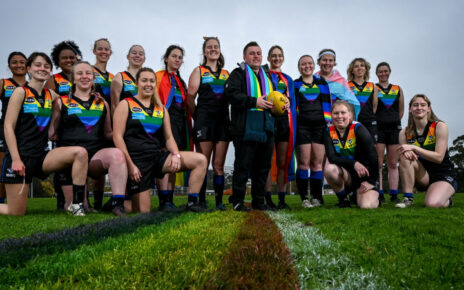Marceles Duncan already stands 6-foot-3 and can dunk a basketball.
He’s only 12 years old.
Marceles’ mother and coaches recognize his exceptional size, talent and passion. It’s the right combination to get him onto a college team. But Marceles needs to be seen by recruiters and coaches. And that’s just not going to happen if he stays home in Denver on the weekends .
So eight to 10 times per year, Marceles travels with his club team, College Bound Elite Basketball Academy, to other cities to play and be seen. His mother, Jenne Duncan, spends about $10,000 a year on club fees and travel, stretching her family’s budget to its limit so her son has a chance to reach his basketball goals. Add shoes, compression shirts and other odds and ends, and the expenses start to add up.
“As a family, we try to cut things here and there, save here and there,” Duncan said. “As a team, though, we try to do some fundraising. But it’s hard because it’s year-round and every year you’re asking the same people for money.”

This year, Chance Sports, a new organization created to fund club participation for children, stepped in to help. Marceles received a $1,000 scholarship that will be applied toward travel to tournaments.
“It gives us more opportunity. It’s easier for me,” said Duncan, who often picks up overtime to fund trips. “I don’t have to work as hard. It allows us to do more things.”
Chance Sports was created in late 2022 by state Sen. James Coleman and former state Rep. Colin Larson to help close financial gaps for children from low-income families who want to play competitive club sports. The two joined forces with the Daniels Fund, which gave the organization $300,000 and pledged another $200,000 in matching funds to encourage donations. On Thursday, Chance Sports made its public debut in a news conference where Denver Mayor Michael Hancock announced the city would pony up at least $200,000 for the non-profit.
The non-profit awarded its first scholarships this winter to Denver basketball players. Later this year, Denver athletes who participate in other club sports will receive money. The first financial awards will be between $1,000 to $3,000 per athlete, depending on the sport and player’s needs.
But Chance Sports has ambitions almost as lofty as Marceles’. The founders hope to grow large enough to expand across the Front Range and become a statewide program, helping young people participate in sports such as volleyball, track and field, football and cheer.
Youth sports is a booming business, and children who set their sights on high school and college athletics now train and compete year-round with club teams that travel across the country.
The average family pays an estimated $9,000 per year for just one child’s primary sport, according to Chance Sports research. Children from low-income families are more likely to quit sports because their parents can’t afford the club fees, equipment or travel.
Some sports are more expensive than others, depending on equipment and how much individualized coaching is required. For example, a teen who wants to play quarterback likely needs to work with a private coach or a slick-fielding baseball player might see a personal hitting coach.
“These club teams cost thousands of dollars and it’s becoming a barrier,” Larson said.

Coleman and Larson hatched the idea for Chance Sports after serving together on an education committee at the legislature. Coleman had children participating in youth sports and heard about other young people whose families did not have enough money for them to compete.
“If it’s financially burdensome for us, it probably is for others, too,” Coleman said.
The Daniels Fund, a Colorado-based non-profit that runs a scholarship program, agreed to support Chance Sports because its founder Bill Daniels was a Golden Gloves boxer who credited sports for his business success, said Hanna Skandera, the executive director.
Children who compete in athletics learn teamwork, grit, perseverance and other skills that benefit them in school and as working adults, said Skandera, who was a track and cross country athlete.
“All kids should have an opportunity to play,” she said.
During a short speech at last week’s news conference, Hancock said the city’s contribution fits with its goals of reducing youth violence. Providing an opportunity to play club sports will help children be a part of something that keeps them busy and engaged.
He later attended a meeting at Denver East High, where a student and soccer player, 16-year-old Luis Garcia, was killed by gunfire while sitting in his car near the campus.
“What we are witnessing right here, right now, is what we can do to end youth violence,” Hancock said. “This stuff matters.”

Hancock did not know exactly how much the city would contribute, saying it would be at least $200,000 to match the Daniels Fund’s offer. He said the money would come from the $12.5 million the city received from the Broncos sale.
Rodney Bates founded the Lady Black Hawks youth basketball team in 2010 after recognizing there were no club teams for girls in Northeast Denver’s Park Hill neighborhood. He coaches about 100 girls in third through 12th grade. In the coming months, his teams will travel to multiple states to play games.
“College scouts spend less time going to local high schools,” Bates said. “Scouts are looking on the national level at these exposure tournaments. If a young girl wants to be seen, she has to play club sports.”
Marceles Duncan’s twin sister, Nylah, plays for the Lady Black Hawks and she, too, is aiming for a college scholarship — either in basketball or academics. Either way, club basketball will help, she said.
“They’re blessed to be tall so they can play basketball,” Jenne Duncan said of her children. “The goal is for each one to get a scholarship to keep moving forward.”
Yasin Sekue, 14, plays with Marceles on CB Elite.
The family will apply his $1,000 toward a tournament in Dallas, his mother, Danyell Sekue said. His plane ticket cost almost $300, and the hotel room for two nights cost $340.
“That’s half the money right there,” Sekue said.

Sekue or her husband accompany Yasin on every trip so his award from Chance Sports will trim the family travel expenses. Overall, there will be a little bit more money in the household budget for housing, food, gasoline and other things a family of four needs, she said.
“We can’t spend it all on basketball,” Sekue said.
Sometimes, the thought of how much youth sports costs “makes my stomach turn,” Danyell said.
But her son is tall, talented and goal-oriented. If he wants to play in college, the family will find a way to pay for it. The money is worth it, she said, not just for the national exposure, but for her son’s overall growth.
“The goal is to go to college by any means,” Sekue said.
Source: Read Full Article

